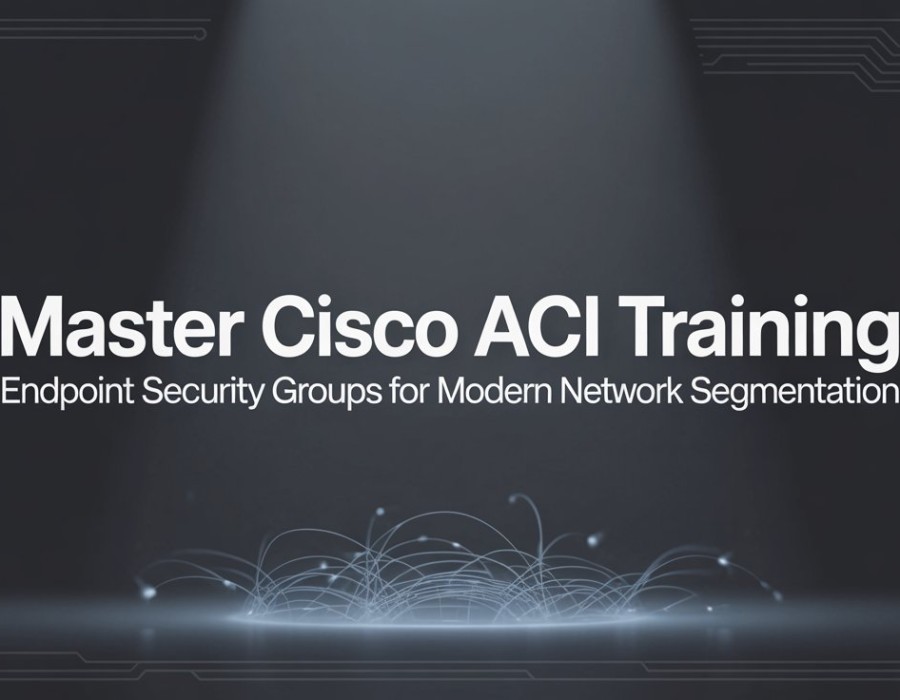In the rapidly evolving world of networking, understanding advanced technologies is crucial for network professionals. Cisco ACI Training provides learners with the knowledge and hands-on skills to manage modern data center networks efficiently. One of the most significant concepts in this training is the use of Endpoint Security Groups (ESGs), which play a pivotal role in modern network segmentation. By learning how to work with ESGs, network administrators can ensure their networks are secure, organized, and highly efficient.
What Are Endpoint Security Groups?
Endpoint Security Groups are a fundamental component of Cisco’s Application Centric Infrastructure (ACI). In simple terms, ESGs are logical groupings of endpoints—like servers, virtual machines, or devices—that share similar security requirements. By grouping endpoints, administrators can apply policies consistently and automatically, which reduces errors and enhances security across the network.
Traditional networking relies heavily on VLANs and IP subnets to segment networks. While effective to some extent, these methods can become complicated and hard to manage as the network grows. Cisco ACI introduces a policy-driven approach where security and segmentation are applied based on logical groupings rather than physical or IP-based boundaries. This makes managing large-scale networks much easier.
How ESGs Enhance Modern Network Segmentation
Modern network segmentation focuses on isolating workloads and controlling communication between them to improve security. Endpoint Security Groups allow administrators to define which devices or applications can communicate with each other. For example, in a multi-tier application, database servers can be grouped in one ESG and web servers in another. Communication policies can then be applied between these ESGs to ensure only necessary traffic is allowed, minimizing security risks.
This approach offers several advantages:
- Simplified Management: Instead of managing individual firewall rules for each device, policies are applied at the ESG level.
- Dynamic Scalability: New devices joining the network automatically inherit the security policies of their ESG, reducing manual configuration.
- Enhanced Security: Limiting unnecessary communication between ESGs reduces the attack surface for potential cyber threats.
- Policy Consistency: Policies applied to ESGs ensure uniform enforcement across the network, minimizing human errors.
Cisco ACI Training Online: Practical Skills You Gain
By enrolling in Cisco ACI Training Online, learners can gain hands-on experience in configuring Endpoint Security Groups and implementing network segmentation. Training includes:
- Creating and managing ESGs in a lab environment.
- Defining communication policies between ESGs.
- Applying contracts to control traffic between endpoints.
- Monitoring and troubleshooting ESGs to ensure policies are enforced correctly.
These skills prepare network professionals to handle real-world challenges in data centers, especially when managing large-scale enterprise networks where security and segmentation are critical.
Real-World Applications of ESGs
Many organizations are moving toward zero-trust security models, which rely heavily on segmentation to restrict access based on identity and policy. ESGs make this possible by grouping endpoints and applying security policies consistently. For example, in a hospital network, medical devices can be placed in separate ESGs from administrative systems to protect sensitive patient data. Similarly, in financial institutions, ESGs ensure that payment processing servers communicate only with authorized applications, reducing the risk of breaches.
The ability to design and enforce policies using ESGs is one of the core benefits of Cisco ACI and a key topic in Cisco ACI Training.
Conclusion
Mastering Endpoint Security Groups through Cisco ACI Training equips network professionals with the knowledge to implement effective, policy-driven network segmentation. By understanding ESGs, learners can improve security, simplify network management, and scale operations efficiently. For those looking to advance their networking career, enrolling in a Cisco ACI Course or achieving Cisco ACI Certification is highly beneficial. Whether through online or in-person training, these certifications validate your skills in managing modern data center networks and implementing advanced segmentation strategies.





Comments